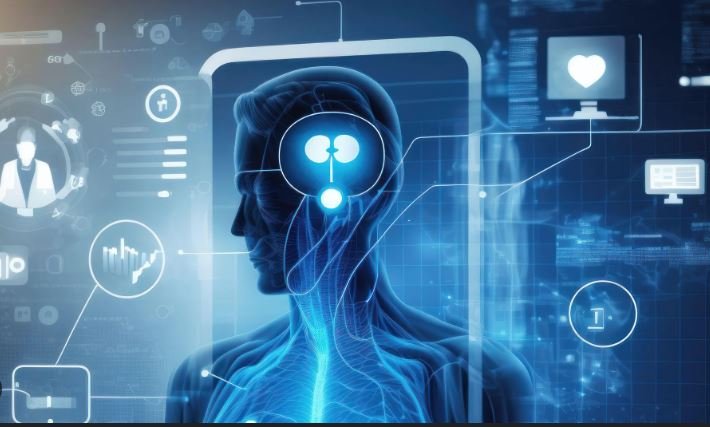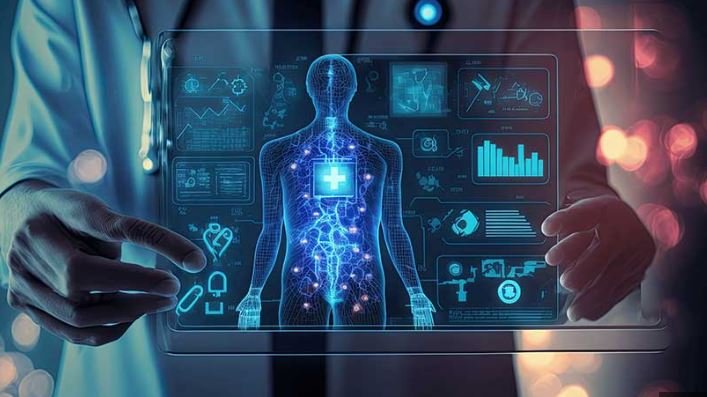The role of artificial intelligence in healthcare diagnostics is revolutionizing the way medical professionals identify and treat diseases. By leveraging advanced machine learning algorithms, AI systems are making diagnostics faster, more accurate, and cost-effective. This transformation is enhancing patient care and allowing healthcare systems to operate more efficiently.

Improving Diagnostic Accuracy with AI
The role of artificial intelligence in healthcare diagnostics is most evident in its ability to improve diagnostic accuracy. AI algorithms are capable of analyzing vast amounts of medical data, such as imaging scans, lab results, and patient histories, with precision and speed.
Firstly, AI assists radiologists by analyzing medical images like X-rays, MRIs, and CT scans. AI-powered tools detect subtle patterns and anomalies that may go unnoticed by the human eye. This ability improves early detection of diseases, such as cancer and neurological conditions.
Secondly, AI in pathology helps automate the analysis of tissue samples. Machine learning models can identify abnormal cells and tissues, providing more consistent and accurate diagnoses than traditional methods.
Thirdly, AI improves diagnostics in genetic testing. By analyzing genetic data, AI tools can predict the likelihood of hereditary diseases, allowing for more personalized treatment plans and early intervention.
Enhancing Efficiency in Diagnostic Processes
The role of artificial intelligence in healthcare diagnostics also extends to improving efficiency in diagnostic processes. By automating routine tasks and supporting medical professionals, AI reduces time spent on manual work, freeing up healthcare workers for more critical tasks.
Firstly, AI streamlines the triage process by quickly analyzing symptoms and medical history. AI-powered diagnostic systems provide initial assessments, which help prioritize patients based on the severity of their conditions.
Secondly, AI assists with medical data organization. Healthcare providers often deal with extensive patient data, and AI algorithms can categorize and retrieve this information efficiently. This capability reduces the time spent searching for records and ensures that clinicians have access to the most up-to-date data.
Thirdly, AI supports the interpretation of complex test results. For instance, in cardiology, AI tools can analyze ECG data to detect irregular heart patterns more accurately and quickly than manual interpretation.
Reducing Diagnostic Errors with AI
The role of artificial intelligence in healthcare diagnostics is critical in reducing diagnostic errors. Human error, especially in high-pressure environments, can lead to misdiagnoses or delayed treatment. AI’s ability to continuously learn and improve makes it a reliable partner in the diagnostic process.
Firstly, AI reduces human error by providing second opinions. In medical imaging, AI systems double-check radiologists’ conclusions, increasing the accuracy of diagnosis and reducing the likelihood of missing critical conditions.
Secondly, AI eliminates biases that can affect diagnosis. Machine learning models focus on the data without being influenced by external factors, such as a doctor’s experience or preconceptions, ensuring a more objective and accurate diagnosis.
Thirdly, AI aids in diagnosing rare diseases. With access to extensive databases and the ability to recognize patterns across thousands of cases, AI systems can identify diseases that may not be immediately obvious to healthcare professionals.
Conclusion
In conclusion, the role of artificial intelligence in healthcare diagnostics is transforming the medical field. By improving accuracy, enhancing efficiency, and reducing diagnostic errors, AI is playing an essential role in the future of healthcare. As AI technology continues to evolve, its integration into diagnostic practices will lead to better patient outcomes and more efficient healthcare systems. The ongoing advancements in AI will undoubtedly continue to shape the future of diagnostics, making it indispensable in modern medicine.
